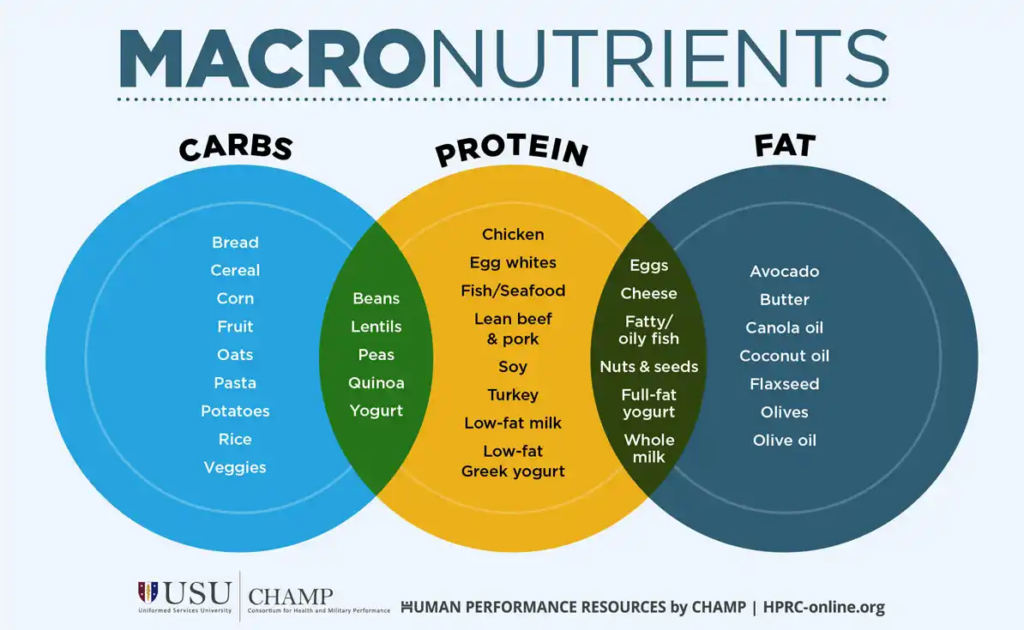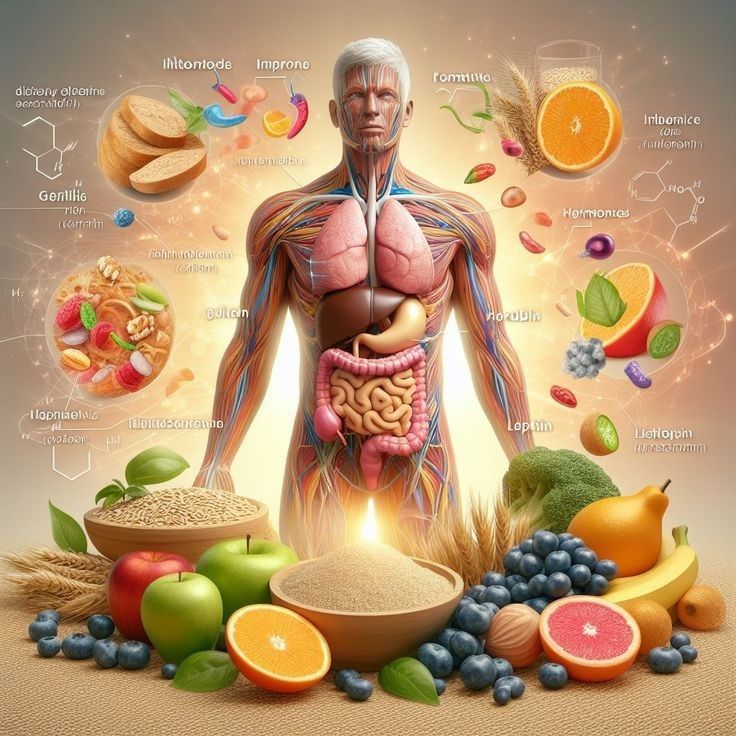"Understanding Macronutrients: What You Need for Optimal Health and Fitness"

When it comes to achieving your health and fitness goals, whether it’s building muscle, losing weight, or simply maintaining a healthy lifestyle, understanding macronutrients is essential. Macronutrients—protein, carbohydrates, and fats—are the three primary nutrients your body needs in large amounts to function properly. In this blog, we’ll dive into what macronutrients are, how they work, and how to balance them for optimal health and fitness.

What Are Macronutrients?
Macronutrients are nutrients that provide energy to the body, and they are needed in large amounts to maintain health and proper body function. They include:
- Carbohydrates
- Proteins
- Fats
Each of these macronutrients provides a specific amount of energy (measured in calories) and supports different bodily functions that are crucial for maintaining and improving health. Balancing the intake of these macronutrients according to your goals will help you maximize energy, performance, and recovery.

1. Carbohydrates: The Body’s Main Source of Energy
Carbohydrates are often misunderstood and wrongly demonized in many modern diet trends. However, they are the body’s primary and most readily available source of energy. When consumed, carbohydrates break down into glucose (sugar), which is used by your cells for energy. This energy fuels both your muscles during physical activity and your brain for cognitive function.
Types of Carbohydrates:
- Simple Carbs: These are sugars, like those found in candy, soft drinks, and processed foods. Simple carbs are digested quickly, leading to rapid spikes in blood sugar and energy. While they may provide an immediate boost, they don’t sustain energy levels over time.
- Complex Carbs: Found in foods like whole grains, legumes, vegetables, and fruits, complex carbs are broken down more slowly, providing a steady, long-lasting source of energy. They are also rich in fiber, which is beneficial for digestive health.
Carbs and Fitness: Carbohydrates are crucial for physical performance, particularly during high-intensity or endurance exercise. They are stored in the muscles and liver as glycogen, which acts as a fuel source during exercise. When glycogen stores are depleted (such as during long workouts or intense physical exertion), performance can decline, leading to fatigue.
2. Proteins: Building Blocks for Muscle and Repair
Proteins are composed of amino acids, which are the building blocks for your muscles, tissues, enzymes, and hormones. After exercise, especially strength training or resistance workouts, your muscles need protein to repair the microscopic tears that occur during exercise. Consuming enough protein helps your muscles recover, grow, and maintain their strength.
Functions of Protein:
- Muscle Growth and Repair: Protein is essential for building and repairing muscle fibers after exercise. Without sufficient protein intake, recovery is delayed, and muscle gains may be hindered.
- Immune Function: Proteins support immune system health by creating antibodies that fight off infections and illnesses.
- Metabolism: Proteins can help regulate metabolic processes and maintain healthy body functions.
Protein and Fitness: For individuals looking to build muscle or lose fat, protein plays a crucial role in preserving lean mass. Consuming protein after exercise ensures that the muscles get the necessary nutrients for repair and growth. Additionally, protein has a higher thermic effect compared to carbs and fats, meaning your body burns more calories digesting it.

3. Fats: Vital for Hormonal Health and Long-Term Energy
Fats are often feared and misunderstood, but they are an essential nutrient for overall health and fitness. Fats support various bodily functions, such as hormone production, nutrient absorption, and brain function. In fact, fat is crucial for maintaining healthy levels of testosterone and estrogen, hormones that are key for muscle growth and overall health.
There are three main types of fats:
- Unsaturated Fats: Found in foods like avocados, olive oil, nuts, and fatty fish (salmon, mackerel). Unsaturated fats help reduce inflammation, support heart health, and improve cholesterol levels.
- Saturated Fats: Found in animal products like meat, butter, and cheese, as well as some plant oils. While moderation is key, saturated fats are not inherently bad and can be part of a balanced diet.
- Trans Fats: These are artificially created fats found in processed foods and should be avoided as much as possible, as they can lead to heart disease and other health issues.



4. Balancing Macronutrients for Your Fitness Goals
To optimize your fitness journey, it’s essential to find the right balance of macronutrients based on your goals. Here’s a general breakdown of how you might adjust your macronutrient intake based on specific objectives:
- For Weight Loss: A higher protein intake is important to maintain lean muscle mass while in a calorie deficit. Reducing carbohydrate intake and increasing healthy fats can help keep you feeling satisfied while also supporting fat loss.
- For Muscle Gain: A higher carbohydrate and protein intake is necessary to fuel workouts and promote muscle recovery and growth. Sufficient protein is key for muscle building, while carbohydrates provide the energy needed to perform well in strength training.
- For Endurance Sports: A higher intake of carbohydrates is necessary to maintain glycogen stores, while moderate protein and fat intake will support sustained energy and recovery.

Conclusion
Macronutrients—carbohydrates, proteins, and fats—are vital for achieving optimal health and fitness. Each plays a unique role in fueling your body, supporting muscle growth, enhancing recovery, and maintaining overall health. By understanding the importance of each macronutrient and adjusting their intake according to your specific fitness goals, you can ensure that your body receives the nutrition it needs to perform at its best. Whether you’re looking to build muscle, lose weight, or improve athletic performance, balancing your macronutrient intake will help you achieve the results you desire.
